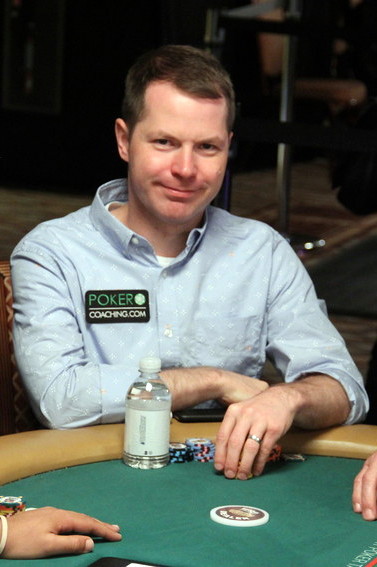






Poker Strategy With Jonathan Little: You Are Usually Not Pot Committed On The RiverDevelop Your Poker Skills And Learn How To Crush Games At PokerCoaching.com/CardPlayer |
|
|

Jonathan Little
I was recently told about a poker hand that illustrates a few key errors that many amateur players make on a regular basis.
Somewhat early in a $500 buy-in tournament with blinds at 200-400 with a 400 big blind ante, a straightforward recreational player in first position raised to 800 out of his 12,000 effective stack and the player in the cutoff, who was loose and passive, called. Hero looked down at A K
K on the button and three-bet to 2,100.
on the button and three-bet to 2,100.
While three-betting with your best hands is certainly the right play, you should make it a bit larger, perhaps to 3,400.
The problem with making it 2,100 is that your opponents are not making much of a mistake by calling with most of their range due to their excellent pot odds. Even if you had A-A, you would prefer hands like 6-6, Q-J and 9-8 suited either call a larger three-bet or fold.
As expected, both opponents called. The flop came A 8
8 5
5 , giving Hero top pair. Everyone checked to Hero, who bet 3,300 into the 7,200 pot.
, giving Hero top pair. Everyone checked to Hero, who bet 3,300 into the 7,200 pot.
While the small preflop three-bet was a mistake, the small flop bet is ideal. Notice that if the bet gets called, the pot will be 13,800 and the remaining stacks will be 6,500, allowing for an easy 50% pot all-in on safe turns.
If Hero bet larger, he may induce his opponents to make big folds with hands like 9-9 or 9-8, which would be a disaster, given those hands are drawing thin. There is no merit in betting large to “protect” against draws because most draws will be getting the right price to call even a huge all-in bet. In general, with your strong made hands, your main concern should be getting value from inferior made hands, not forcing your opponents to fold hands that you crush.
Only the player in first position called. The turn was the 9 . The player in first position went all-in.
. The player in first position went all-in.
At this point, I think Hero has an easy fold. While he beats the obvious missed flush draws and overplayed one-pairs, most straightforward recreational players will continue checking with those hands.
Most likely, the opponent has 7-6 suited, A-9, or 9-8, all of which crush Hero’s top pair, top kicker. Even if the opponent has some flush draws in his range, Hero should still fold because there are relatively few combinations of flush draws. And even then, they still have a decent chance to improve on the river.
Hero made the stereotypical mistake of calling, vastly overvaluing his top pair. As expected, the opponent had 7 6
6 for the straightforwardly played turned straight.
for the straightforwardly played turned straight.
Many amateur players presume this is a cooler, but Hero should have realized he was against a strong range and made the disciplined fold. Do not think that you are “pot committed” just because you have half your stack in the pot. If you are drawing dead, you are never pot committed.
In this situation against this specific opponent, I would have called off with A-9 and better made hands. When playing the small stakes, if you have no reason to believe your opponent is getting out of line, it is usually best to assume they have what they are representing.
Get this free bluff catching flowchart and video.
If you want more resources to help you improve your game, I put together a course called The 25 Biggest Leaks and How to Fix Them. This course is completely free inside the Card Player Poker School!
When you join the Card Player Poker School (it’s free to join), you’ll also get:
✔ Free downloadable preflop charts
✔ GTO preflop charts
✔ Video Classes
✔ Interactive Hand Quizzes
✔ Free Course: Master the Fundamentals
✔ Free Course: The 25 Biggest Leaks and How to Fix Them
✔ Free training every week
 Jonathan Little is a two-time WPT champion with more than $7 million in live tournament earnings, best-selling author of 15 educational poker books, and 2019 GPI Poker Personality of the Year. If you want to increase your poker skills and learn to crush the games, check out his training site at PokerCoaching.com/cardplayer.
Jonathan Little is a two-time WPT champion with more than $7 million in live tournament earnings, best-selling author of 15 educational poker books, and 2019 GPI Poker Personality of the Year. If you want to increase your poker skills and learn to crush the games, check out his training site at PokerCoaching.com/cardplayer.
